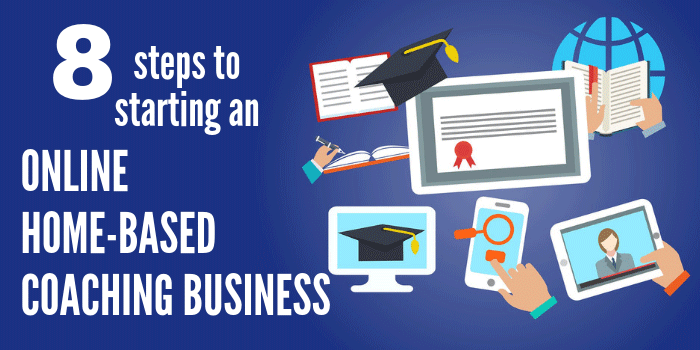Starting a coaching business is a juicy saucy task. There’s plenty of wisdom on how to do it online. People share tips from their own experiences, stories and so on. So today, Mama Nora is going to tell you a few basic things about steps to starting on online home-based coaching business.
There are endless resources and all of this is available to you if you have enough time to do research and figure out which tips are good and suitable for your business and which ones are not. The process really is overwhelming. So we have compiled a list of steps that you need to take in order to start your coaching business. Here they are. Listen to Nora!

Step 1: There are many types of coaching - Which one will you do?
Coaching is a broad topic and it can cover various things. However, you need to opt for one of the niches. Will you do small business coaching, language coaching, public speaking coaching or something else entirely? This one is something you probably already have a vague idea on so it will not be a big deal.
Just combine your interests and expertise with a comprehensive program of learning. When my friend was wondering about coaching and thinking about getting into it, his biggest problem was the inability to decide on a niche.
I helped him by exploring what he loved to do the most and we arrived at the conclusion that he loves public speaking and that he is good at it - so, he did just that. This is something you can do - just look into your life and figure out what is the topic that you could work on every day without losing enthusiasm.
Step 2: Think about getting some training first
Before you start coaching on any subject, get some training. This will help you be a better coach and it will also help your students learn better. You need great reviews if you want your students to value you and if you want them to keep coming so this is one of the best things that you can do.
Having an official confirmation, a ccertificate or a dimploma that you are, in fact, a good coach. You can even hang it on the wall - I, personally, feel it helps people be reassured of your worth.
Oh, the colorful world of certifications, where you can go from being a mere mortal to a revered expert with a shiny badge to prove your mastery. Now, when venturing into the coaching territory, you might stumble upon a crossroad of whether to get certified or wing it. Certifications in the coaching arena are like those secret sauces that can give your brand a savory edge. Though not always mandatory, they sure do add a snazzy flair to your credentials.
Life Coaching

Life Coaching
Let's consider life coaching, for instance. There isn’t a strict law penned down that you must be certified to dish out wisdom. However, a certification from a reputable institution could provide a comforting assurance to your clients.
They'd likely prefer someone whose wisdom has been vetted and stamped with approval, rather than a self-proclaimed guru.
Fitness Coaching
Fitness coaching is another kettle of fish where certifications are more than just fancy add-ons. They're almost like your entry ticket to the show. If you fancy guiding folks towards their dream physique or better health, a certification is the way to go. It not only shows you know your squats from your lunges but also keeps you in the clear legally, should an overzealous client attempt a backflip and...well, let’s not venture there.

Fitness Coaching
Let's not forget our pals in the corporate coaching sector. Imagine waltzing into a boardroom, ready to tune up the performance of a high-flying executive team. A certification here isn't just about having a fancy title; it’s like having a solid handshake in a world where first impressions count. It shouts, "I know my stuff, and I’m here to turbocharge your team."
Now, how do you snag these golden tickets? Start by researching reputable bodies associated with your coaching field. Each has its own Hogwarts-style houses, also known as accreditation programs. They have courses that churn through a syllabus over several months, ending in a grand exam. Once you pass, voila! You’re now a certified coach ready to sprinkle your newly-acquired official knowledge onto the masses.
Oh, and the cost? Well, getting certified isn't exactly a stroll through a free park. It’s more like an investment into a treasure trove of credibility, so it's wise to plan for it. Also, we may live in a world of instant gratification, but the certification process can be a slow-cooker, demanding your patience.
All in all, snagging a certification can be a cheeky yet shrewd move in establishing your coaching empire. It’s not just about having a shiny badge, but earning a ticket of trust in a field where your advice could potentially be a game-changer in someone's life.
Step 3: Decide on your business structure
Business structure is an important thing in your business life. You have several options and each one of these options comes with certain pros, cons and legal requirements.

- Sole Proprietorship
- Limited Liability Company (LLC)
- Cooperative
- Corporation
- Partnership
- S Corporation
Learn enough on each of these types and pick one that suits your possibilities and conditions best. It’s best to go to a professional who can help you with this based on your own needs. My company, for example, is a solo proprietorship.
Step 4: Pick a business name
Choosing a business name may not seem like such a big deal at first but it can be once you start thinking it over. There are so many names in this world that it can be hard to decide which one suits your business best. This is entirely up to you. Yet, you should make your business name relevant to the niche you are working in and there should be a keyword in there, if at all possible.
Choose something that’s meaningful to you and that it’s something with good symbolism. You can even go for funny, if thats your brand personality. You can even use your own name and that would suffice.
Step 5: Choose a marketing and sales funnel
Because I don't know what I'm talking about, I'll say something similar again in Step 7, but bear with me.
How will you sell your services? Through your website, social media or any other platform? How will you market your services? There are many options for each of these and you need to make decisions that will work well for your business. Of course, these can change but it’s good to start in a good spot. I started on my own website and used social media heavily until I started getting clients. Most of my friends did it too. But your best bet is to try out several methods until you arrive at a conclusion.
Let’s break down this headliner of a process in a way that even Mick Jagger would approve of.
1. Awareness: The Stage Presence
Before you sell out stadiums, people need to know you exist. Your mission, should you choose to accept it, is to make some noise. Utilize social media, blogs, and paid advertising to show the world that you are here and ready to rock. At this stage, your goal is to create catchy, head-banging content that catches the eye and sticks in the mind like a classic rock anthem.

Online Presence
2. Interest: The Opening Act
Now that you have their attention, it's time to woo them with your opening act. Offer something tantalizing that makes them want to stick around for the main show. This could be a killer blog post, a free eBook, or a webinar that spins their heads right round. This is where you get to show off your chops, giving a taste of what’s to come, kindling a burning interest in your offerings.
3. Consideration: The VIP Backstage Pass
Congratulations! Your audience is hooked, and they are considering buying a ticket to your show. Now, offer them a sneak peek behind the velvet rope. Provide case studies, testimonials, or a free consultation to show what life is like on the other side. They are evaluating if they want to get on this rock 'n roll train, so give them enough reasons to jump aboard with both feet!
4. Action: Merchandise Booth Madness
This is where the magic happens! Your audience is now ready to take action, but they need that nudge to run to the merchandise booth and snag their piece of memorabilia (your product/service). Offer them a limited-time discount, a bonus item, or an exclusive bundle that makes them whip out their wallets faster than you can say “Encore!”
5. Loyalty: The Fan Club
So, they loved the concert and bought the t-shirt. But how do you turn these one-time attendees into lifetime fan club members? Keep the love alive by offering loyalty programs, exclusive deals, and continuous value that keep them coming back for more. Keep the dialogue open and keep rocking their world with your superb customer service.
6. Advocacy: Word of Mouth Tour
The pinnacle of a successful rockstar entrepreneur's journey is when your fans become your promoters. Encourage reviews, testimonials, and referrals. Give them reasons to shout your name from the rooftops and bring their friends along for the ride next time around.
There you have it, the backstage tour of how a marketing and sales funnel can turn strangers into your loyal groupies, spreading the word about your legendary offerings. Now, grab your marketing guitar, amp up your sales drum, and get ready to rock the entrepreneurial stage!
Step 6: Gather everything you’ll need

What will you need for your coaching business? Get a good phone and a good headset for phone coaching, find a good platform for online coaching and so on. I, personally, like to go for video chats more. I used Skype for a while, but you should choose an option that would match most of your clients.
Launching an online course is like throwing a fabulous party; you need the right venue, some glittering invitations, a touch of fancy decor, and a cake that steals the show. Here's how you can get your virtual shindig started along with the cost that may pinch or tickle your wallet:
The Idea (Cost: Your Brain Juice):
- Your course idea is your star. What unique wisdom nuggets are you ready to share with the eager learners out there? This part only costs your time, creativity, and perhaps a few sleepless nights of brainstorming.
- Course Content Creation (Cost: $0 to $1,000+):
- You’ll need to create engaging materials. Videos, worksheets, and quizzes are the traditional trio. The costs can range from a bootstrapped zero to over a grand, depending on how polished you want your content to look.
- Learning Management System (LMS) (Cost: $0 to $100+/month):
- Your LMS is like the swanky venue where your course party happens. Platforms like Teachable or Thinkific are popular choices, with prices ranging from free to $100+ per month, depending on the features you crave.
- Domain and Hosting (Cost: $10 to $100+/year):
- You’ll need a catchy domain and a reliable hosting service. This is like your party's address, so make it snazzy!
- Website (Cost: $0 to $5,000+):
- A user-friendly, attractive website is your online foyer. Costs can range from nothing (if you DIY) to thousands if you hire a web designer who’s the bee's knees.
- Email Marketing Tool (Cost: $0 to $100+/month):
- This is your digital megaphone to shout out invitations to your course. Tools like Mailchimp can start free, but fancier features will have you shelling out more clams.
- Payment Processor (Cost: Transaction Fees):
- You’ll need a way to graciously accept money from your students. Payment processors like PayPal or Stripe will do the job, with transaction fees usually nibbling away a small percentage of your earnings.
- Marketing (Cost: $0 to Sky’s the Limit):
- Last but certainly not least, you’ll need to market your course. Whether you choose paid advertising, influencer collaborations, or guerrilla social media tactics, your budget here can range from pocket change to a small treasure chest.
- Legalities (Cost: Varies):
- Don't forget to set aside some doubloons for legal advice to ensure your course and its content are all above board. This cost can vary widely based on local rates and the complexity of your needs.
The world of online courses is a cornucopia of opportunity waiting for you to dive in, though each dive might cause a different level of splash to your bank account.
Step 7: Start a website
Having your own website is a great starting point when it comes to building a coaching business. In a way, it’s your storefront, a place you’ll send people to when they ask for more information. It’s also a place where people can book you and possibly learn something from your content.
As a storefront, your website needs to look good. This means that you will have to create a stellar design and write great content and copy that can sell your services.
If you are not a great writer you have two options - hire someone or learn it yourself. Our recommendation would be to learn how to write yourself because it will be much easier. Especially with a variety of resources such as:
What Do You Advocate?
Step 8: Create a marketing strategy
For one, figure out where you’ll market your services. This is very important because it will dictate your content, to a point. Create an email list building strategy and a social media strategy that will help you promote your services. You should make sure that all of this is mapped out before you start. At first, you might feel desperate with your marketing. But, with a bit of effort, you can definitely do it.
Starting any business is hard but rewarding. You can expect many hurdles along the way but you should know how to overcome them and have the necessary amount of motivation to do so. Enjoy your new business and create a good standing point for yourself by thinking in advance.
1. Ingredient Gathering: Research and Insights
Before you can start whipping up a marketing feast, you need to know what flavors you're working with. Dive into market research to understand your competitors, target market, and the industry landscape. It’s like knowing the difference between a filet mignon and a can of Spam.
2. Recipe Selection: Goals and Objectives

Goals and Objectives
What’s cooking, good looking? It's time to decide what dish you're going to master. Your marketing goals are the recipe you’ll follow. Whether it's increasing brand awareness (making your restaurant the talk of the town) or boosting sales (getting more bums on seats), having clear objectives is like having a recipe to your grandma's secret sauce.
3. Prep Work: Target Audience Profiling
Know thy diner. Are they veggie lovers or meat aficionados? Craving sweet or savory? Identifying and understanding your target audience is the prep work that ensures your marketing meals will have a line of hungry patrons waiting outside.
4. Kitchen Setup: Channel Selection
Now, where will you cook up this marketing storm? Selecting the right channels is like choosing the right pots and pans. Social media is your frying pan – quick and hot. Email marketing is your slow cooker – taking its time to perfection. Every channel has its own magic; pick the ones that'll cook your marketing strategy to a delightful crisp.
5. Taste Testing: Content Creation
Content is the spice of your marketing curry. Creating engaging content is like taste-testing; you need to know what flavors pop and what leaves a bad taste in the mouth. Remember, nobody ever craved a bland meal.
6. Fire Up the Grill: Campaign Execution
With all the ingredients prepped and the recipe card at hand, it's showtime! Light the fire, and launch those campaigns. Monitor them closely; you don’t want to serve a burnt marketing soufflé now, do you?
7. The Critics’ Review: Analysis and Optimization
Once the meal is served, await the critics’ reviews. Analyzing the performance of your campaigns is like hearing what the food critics have to say. Learn from their feedback and tweak your recipe for a standing ovation on your next marketing meal.
8. The Leftovers: Retargeting
Not everyone will gobble up your marketing dish on the first serving. Retargeting is like making a killer sandwich with the leftovers for those who missed the feast the first time around.
Your marketing strategy is your cookbook in the bustling kitchen of commerce. Whether you’re serving fast-food ads or gourmet content, make sure it’s cooked to perfection and seasoned with a generous dash of creativity. And always, always keep the kitchen fires of innovation burning!
The Holy Grail: Idea Generation

Idea Generation
Oh honey, listen to Mama Nora. Every grand castle was once just a twinkle in someone’s eye. Your coaching business is no different. It begins with that golden idea, that shimmering vision of helping others find their path. Hold it close, nurture it, like a tiny spark waiting to roar into a hearty fireplace.
Certification: Your Wizard’s Wand
Alrighty, now, entering the coaching territory isn’t like sneaking into a movie theater. You’ll need a ticket, which in your case, is the proper certification. This isn’t just a piece of paper, darling; it's your wizard’s wand, affirming to your clients that you indeed are the Merlin in your chosen field.
Legal Eagle: Dotting the I’s and Crossing the T’s
Every kingdom needs its set of rules, and your home-based coaching empire is no exception. Get acquainted with the legal eagles, ensuring that all your I’s are dotted and your T’s are crossed. You want to build a kingdom, not step into a quagmire.
Tech-Savvy Castle: Your Virtual Abode
We’re crafting empires in modern times, sweet peas, so roll out the digital red carpet. Your website is your castle in the cloud, where seekers come looking for the pearls of wisdom you offer. Make it welcoming, make it grand!
Social Butterfly Effect: Spreading the Word
Oh, the buzz, the chatter, the ripples in the vast pond of social media! As you flutter your wings of wisdom, watch how the word spreads, drawing the seekers to your coaching hearth. Engage in hearty conversations, share your tales of insight, and watch the magic happen.
Teaching Tools: Your Knight’s Armor
Equip yourself with the tools of the trade. From scheduling software to interactive platforms, arm yourself for the wonderful warfare of wisdom. Your tools are your knights in shining armor, aiding you in the noble quest of enlightening souls.
The Wise Owl: Continuous Learning

Continuous Learning
The wise always have an ear tuned to the whispers of knowledge. Stay updated, keep learning. Every new insight is a feather in your cap, preparing you to soar higher in the skies of success.
Tending to Your Garden: Client Relationships
Your clients are the roses in your garden. Tend to them with love, patience, and understanding. As they bloom, so does your coaching garden, spreading the fragrance of success far and wide.
Oh, my blossoming coaches, Mama Nora has ladled out the hearty broth of guidance to fuel your venture into the realms of coaching. With a sprinkle of dedication, a dash of passion, and heaps of love, you're on the right trail to cooking up a successful home-based coaching business. As you trot down this path, know that success isn’t a distant shore, it’s the very soil you tread upon. So, march ahead with gusto, for a fulfilling and prosperous coaching endeavor awaits!

Nora Mork is a business journalist, and content writer for various essay writing services. She helps business create effective marketing and communications strategies, and writes overviews and reviews for many essay-related blog sites.
Author // Nora Mork
